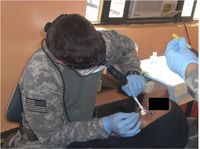Playing a small part in the big picture
Posted: January 17, 2012
Chris Bowen, D.M.D., ’07, is an ATSU-ASDOH grad and United States Army Major. He is the primary dentist for the 10th Special Forces Group (Airborne) at Fort Carson, Colo., and is responsible for the dental readiness of a 1,800-personnel task force of Green Berets. Here, Dr. Bowen tells of his missions in Iraq – experiences that span the depth and breadth of caring for the underserved, of uniting with healthcare professionals across the world, of woefully missing his family, and of proudly serving his country.
……………………………………………….
Special Forces are the absolute best of the military. The duration and intensity of their training is remarkable. Only the best of the best survive training to become Green Berets. The significance and national interest of their missions dictate that they be the most elite soldiers. As the primary dentist supporting these soldiers, it is my responsibility to ensure their dental readiness and train their medics in dental procedures. Dental readiness improves overall combat readiness – the last thing these warriors need is a toothache when they are planning or carrying out an important mission. Their missions involve targeting and acquiring “bad guys,” but they also are tasked with interacting with the local populace wherever they are assigned. This includes performing MEDCAP missions, or Medical Civil Action Projects.
During these missions, healthcare professionals team up with Special Forces and travel to remote villages to assist locals with much needed healthcare. Providing healthcare is an excellent way to establish and maintain relations with locals and gather valuable intelligence. Whenever possible, we partner with Iraqi healthcare professionals and provide care side by side. On one mission, I worked with an Iraqi dentist for several hours and was impressed with his knowledge and skill.
MEDCAPs are not hastily planned. An enormous amount of time and coordination is required to ensure successful healthcare delivery in a secure environment. As a dentist on these missions, I would spend one to two days traveling from my home base, via helicopter or ground convoys, link up with my team, and be briefed on the mission. Physicians, physician assistants, and medics often were part of the team.
MEDCAP locations varied from a health clinic with dental chairs, to a school, to an Iraqi Army base. Conditions were less than favorable. Flexibility and adaptability were key principles to live by. The luxuries of compressed air and suction that we are accustomed to in the United States were unavailable. While I could travel with a large portable dental set-up, normally I brought the minimum amount of equipment needed; it was best to travel light. I packed all of my supplies into a travel case and mostly brought supplies for extractions, although I could perform limited restorative procedures as well. The radiographs that are so important in ensuring a proper diagnosis were unavailable. You simply provide the best service you can with what you have and realize that our “less than ideal” delivery of healthcare is more than some of these patients would receive in a lifetime.
When patients learn that a dentist is available, the line seems to grow exponentially. The delivery of dental care in these environments is low cost, quick, and definitive. Patients would routinely present with longstanding abscesses from decay or periodontal disease. A patient with an infected, periodontally involved (and hence, many times mobile) tooth can receive local anesthesia and an extraction in 10-15 minutes. Thus, dentistry was highly sought after as a way to improve quality of life.
Patients appreciated our work. Success also was aimed at allowing Iraqi physicians and dentists to provide a majority of the work. Unfortunately, not all patients could be treated, as we were limited to basic restorative procedures and extractions. The language barrier made it hard to properly educate patients, even with interpreters available.
Children were the most fun to interact with. As soon as we arrived at a village, kids swarmed us. To spend five minutes kicking a soccer ball with them can truly be a life changing experience for them and us. While many children in Iraq live in harsh environments, they seemed happier and more content with much less than the average child in the United States. It was eye-opening to say the least, and at moments made the long trip away from family a little less harsh.

Dr. Bowen, here in Iraq, resides in Colorado Springs with his wife Jessica, 3-yearold son Carson, and 1-year-old daughter Kaylen.
To be honest, there were long periods of boredom, which affected morale. Dentistry in a deployed environment is geared mainly towards sick call and emergency procedures. It could be slow at times, making it easy to begin questioning why I was there. But, life on base was very nice. Plenty of food, great workout facilities, and hot showers (usually) were a few luxuries. However, as soon as one feels perfectly safe and sound, a mortar could, out of nowhere, land within 400 yards of you and remind you where you are.
Despite any positives, the reality is that your family is 10,000 miles away, and that makes it tough regardless. Rain could pour for days and create a lake outside your room. The heat could soar above 120 degrees, making it miserable for soldiers to carry around a flak jacket, a ruck sack, and any additional equipment they must have. The mud adds five pounds to each boot. It doesn’t take long in an environment like this to realize how blessed and fortunate we truly are.
Soldiers and our allies deserve all of our admiration and support. I’m proud to say that I had the opportunity to play a small part in the big picture.